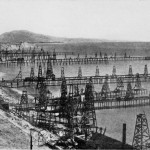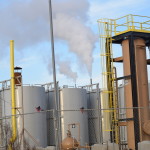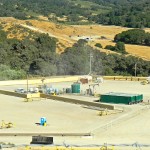
23
Jan, 2016
Where Fracking Bills Go to Die
Originally published by Mission and State, an investigative journalism project supported by a generous grant from the Knight Foundation.
The venue was The Kitchen, a posh Sacramento dinner destination. The guests were a select group of pols occupying seats in the California state legislature. The host was the most powerful oil lobby around, the Western States Petroleum Association. The menu for the September 4 fete featured chilled Maine lobster, sterling caviar, sea urchin, fennel, leeks—and that was just the first course. The $13,000 tab, footed by the WSPA, may have been enough to keep a family of four in groceries for a year, but it was only a drop in the barrel for the oil lobby. According to a recent report by the California Center for Tobacco Policy and Organizing, WSPA has divvied out almost $20 million to politicians since 2009.
 The dinner event came just a couple weeks before Gov. Jerry Brown signed Sen. Fran Pavley’s (D-Agoura Hills) SB 4, better known as the Fracking Bill, on September 20. The bill moved through the Senate, House and onto Brown’s desk, getting amended almost beyond recognition from its original incarnation along the way. Environmentalists had hoped the bill would enact a statewide moratorium on fracking. It didn’t.
The dinner event came just a couple weeks before Gov. Jerry Brown signed Sen. Fran Pavley’s (D-Agoura Hills) SB 4, better known as the Fracking Bill, on September 20. The bill moved through the Senate, House and onto Brown’s desk, getting amended almost beyond recognition from its original incarnation along the way. Environmentalists had hoped the bill would enact a statewide moratorium on fracking. It didn’t.
Instead, the version of SB 4 eventually signed by Brown won very little praise from the environmentalists who’d been cheering Pavley’s bill when it was first introduced. And while SB 4 stops short of banning fracking, it says something about the nation’s nouveaux oil boom that this watered-down bill may end up one of the most stringent fracking regulations in the country.
SB 4 calls for a new study to be conducted on fracking and acidization (another form of well stimulation), and comprehensive permitting and regulatory processes to be implemented with state and local agencies, as well as public disclosure of chemicals used in fracking and acidization projects. In other words, enhanced production techniques will become more transparent via SB 4, but, to environmentalists’ chagrin, California is doing its best to get onboard with the oil boom.
How did SB 4 end up the only surviving piece of fracking regulation during a legislative season that saw numerous bills attempting to ban the practice die in committee, despite a democratic super-majority in the California Legislature?
A look at the invitation list for the aforementioned dinner might explain things. It was mostly comprised of moderate Democrats whose districts lie on or near the oil-rich, 1,750-acre Monterey Shale.
Among the guests were state senators Norma Torres (D-Pomona) and Lou Correa (D-Santa Ana). The least surprising guest was Ron Calderon (D-Montebello)—more than a hundred active Plains Exploration & Production Co. (PXP) oil wells pump out of Calderon’s district. Also attending was Calderon’s former staffer, now Assemblyman Adam Gray (D-Merced) (Incidentally, Calderon is currently under FBI investigation for allegedly taking bribes in an unrelated matter). Assemblymembers Cheryl Brown (D-San Bernardino), and Henry Perea (D-Fresno) also came ready to dine.
State Sen. Hannah-Beth Jackson (D-Santa Barbara), who represents an oil-rich constituency that spans Santa Maria to Filmore, calls these types of WSPA-supported Democrats “Rockefeller” or “business” Democrats, and she butts heads with them over fracking as much as she does with Republicans on the other side of the aisle. The California Republican Party is not necessarily the more oil-friendly party. The nonpartisan election data collection organization Follow the Money reported that the energy and natural resources industry gave about $4.3 million to state Democrats in 2012 compared to the near $2 million handed out to Republicans.
Late last October, Jackson invited her more oil-averse constituents to the geographical center of her district, Ventura County’s Government Center, to rally support for her environmental agenda. She urged them to be what she called “civilian lobbyists” in the face of all the oil money seeping into Sacramento. Addressing the audience, which she buttered up by handing out Hershey’s Kisses, Jackson made it clear from the start that she wants stronger oil regulations, not the type of gutted legislation embodied by SB 4. “The [Department of Oil Gas and Geothermal] regulations were laughable,” she said, addressing one of SB 4’s supposed “wins.”
The oil and gas industry gave $4.3 million to state Democrats in 2012 compared to the $1.9 million handed out to
Opposing narratives of environmental destruction and economic boom accompany the battle over whether to squeeze more oil from the local shale rock. To paint with broad strokes, Republicans want oil jobs while Democrats want environmental safeguards.
But it’s not that simple. Democrat legislators who serve in poorer districts with high unemployment also want the jobs they think the oil boom could bring. At her town hall meeting, Jackson described how that puts some Democrats in the difficult position of trying to serve two masters: oil and the environment. The net effect can be that strong environmental bills lose their teeth as legislators try to walk that thin line.
Jackson likely had Pavley’s recent spats with environmentalists on her mind when she tried to rally the troops at her town hall. Many in the audience had expressed the opinion that SB 4 was a defeat. Jackson countered with a well-rehearsed sidebar about how the legislation went down. In her version of events, Gov. Brown went to Pavley and told her point blank what he would and wouldn’t sign. Brown immediately struck down SB 4′s initial attempts to ban or at least place a moratorium on fracking. Jackson’s take on what the governor eventually signed: “Politics is the art of the possible, not the perfect. We might have to take smaller steps.”
She noted that Assemblyman Das Williams’ (D-Santa Barbara) AB 982, which would have forced frackers to monitor groundwater before and after a frack job, failed. Her own SB 395 proposed that California’s Department of Toxic Substances Control treat fracking fluids as hazardous waste and test for chemical safety. If wastewater tested positive for carcinogenic chemicals, it would have to be disposed in Class I wells instead of the less-regulated Class II wells set aside for oil and gas. She fell a handful of votes short of moving it to the House.
So, we’re left with SB 4, which requires the disclosure of fracking chemicals as well as a public environmental impact report, but falls short of a moratorium. The pleasant surprise was that it would also require the same of acidization, a more common form of drilling in California. In this method, drillers inject acid and chemicals (some known carcinogens) into rock porous enough that it doesn’t need to be fracked. Williams, the bill’s House sponsor, called the inclusion of acidization “a positive eleventh-hour addition” to the bill.
After doing her best to defend SB 4, Jackson opened the forum up for questions. Her audience made it clear it wanted a statewide fracking ban. “If for a minute I thought we could get a moratorium or ban, I would do it,” she said. “As long as there are folks in Kern County or others with 20-percent unemployment, it won’t happen.”
Jackson claimed legislators from the Central Valley strongly oppose fracking regulation, especially, she said, Latino legislators. Part of the problem, Jackson said, is that Latino candidates in poorer districts rely on business interests to fund campaigns. “There is a disconnect between Latino elected leaders and the people they represent,” says Jackson to the mostly white audience. “Most in the Latino community understand environmental concerns and understand social justice.
“My colleagues think fracking is a job creator,” Jackson continued. “In Kern [County], there is no fracking project they don’t want.”
Politics is the art of the possible, not the perfect. We might have to take smaller steps.
Santa Barbara County has a de facto ban on fracking due to regulations requiring a complicated permitting process. According to Kevin Drude, the county’s energy specialist, no company has applied for a fracking permit here since the process was instituted in 2011 following the uproar over Venoco fracking a vineyard of Riesling grapes in Los Alamos.
Now Jackson’s fight heads toward the ocean, where long-standing rumors of drillers fracking offshore were documented in a recent report that came after Associated Press and Environmental Defense Center investigations. “The fact that the California Coastal Commission didn’t know fracking was happening offshore is stunning,” Jackson said.
Jackson has rallied some of her Central Coast colleagues, including Pavley and Williams as well as Noreen Evans (D-Santa Rosa), Bill Monning (D-Carmel) and Mark Stone (D-Scotts Valley) to pressure the California Coastal Commission to enter into the frack battle. Last week the state Coastal Commission called for a ban in state waters.
While the local representatives target state waters, Rep. Lois Capps (D-California) recently wrote a letter to the Department of Interior and Environmental Protection Agency calling for a moratorium to fracking offshore in federal waters, which begin 3 miles from the coast.
When asked what she thought about WSPA’s $13,000 dinner, Jackson replied with a laugh. “I wouldn’t know. I wasn’t invited to the dinner.”
Click here for a Spanish-language version of this story in CASA Magazine. See page 26 of CASA for the article.






You must be logged in to post a comment.